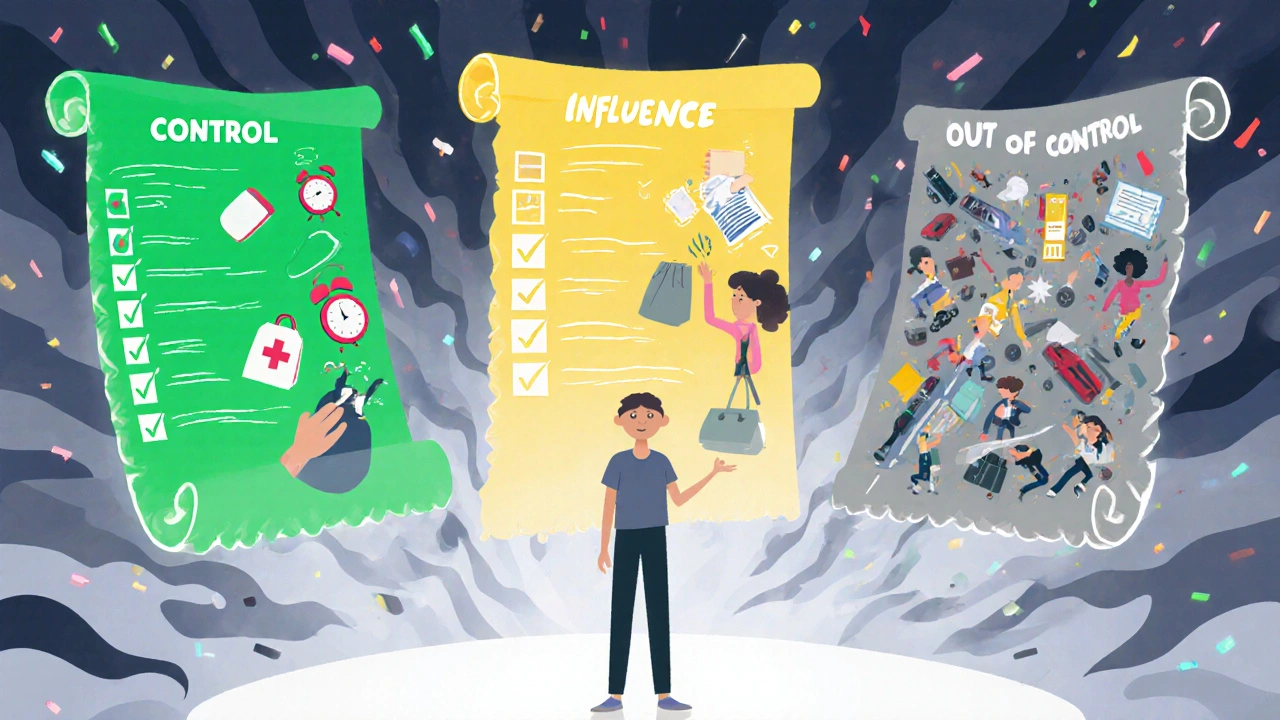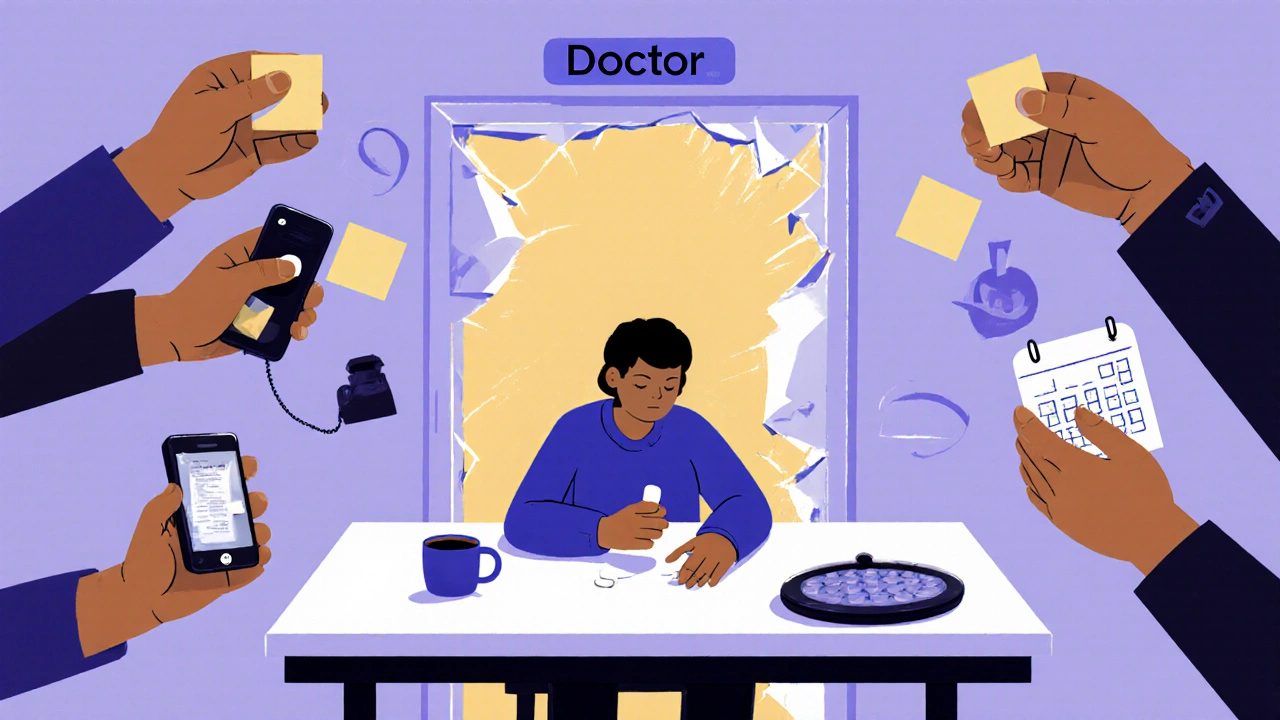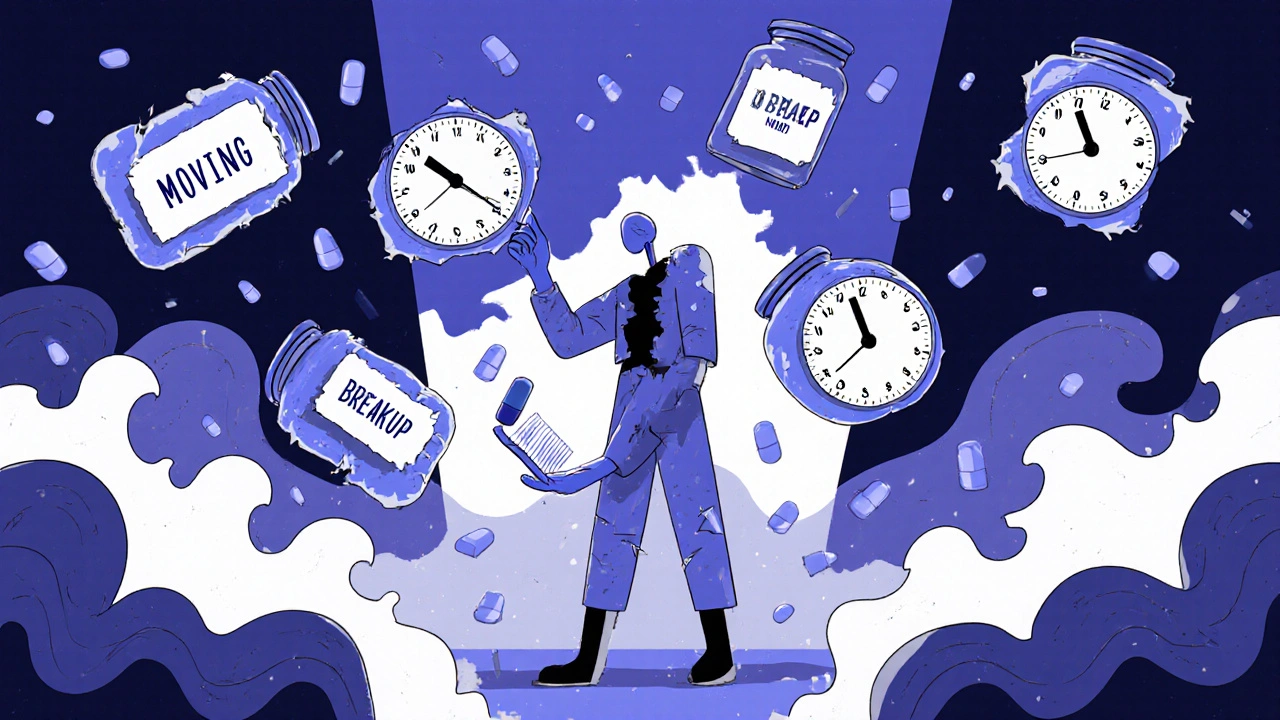When your life changes-whether it’s a new job, a breakup, moving cities, or even just a sudden health scare-your medication routine often falls apart. Not because you don’t care. Not because you’re lazy. But because your brain and body are overwhelmed. Research shows that during major life transitions, medication adherence drops by an average of 32%. That’s not a small slip. That’s a health crisis waiting to happen.
Why Your Medication Routine Crashes During Transitions
It’s not just about forgetting pills. It’s about control. When your world flips, your sense of control shrinks. And when you feel powerless, self-care is the first thing to go. A 2023 study found that 78% of people with chronic conditions stopped taking their meds during major life changes. The top triggers? Relocation (63%), job shifts (58%), and relationship breakdowns (49%). Think about it: if you’re packing boxes, interviewing for a new job, or sitting in a lawyer’s office, your brain doesn’t have room for pill schedules. Your body is flooded with cortisol. Your sleep is gone. Your routine? Destroyed. And if no one asks you how you’re managing your health during all this, you assume it’s fine to pause.The 3-List Method: Take Back Control
One of the most effective tools for staying on track during chaos comes from psychology: the 3-list method. You don’t need to fix everything. You just need to focus on what you can actually move. - Things you can control directly: Taking your pill at the same time every day, setting a phone alarm, keeping your meds in your bag. - Things you can influence: Asking your doctor for a longer prescription, switching to a once-daily pill, asking a friend to check in. - Things outside your control: Your boss’s schedule, your ex’s behavior, traffic delays, the pharmacy running out of stock. The key? Spend 90% of your energy on the first two lists. Ignore the third. A 2023 analysis found that people who did this improved their medication adherence by 22.7%-without changing a single prescription.Build Anchor Routines, Not Rigid Schedules
Forget “take your pill at 8 a.m. sharp.” That’s a setup for failure when your life gets messy. Instead, build anchor routines-small, consistent habits tied to things you’ll always do, no matter what. Examples: - Take your pill after brushing your teeth (morning). - Take it right before you pour your coffee. - Take it when you sit down for dinner. Research shows that keeping just 3-5 of these daily anchors reduces psychological stress by 23% and boosts adherence by 31.4%. Why? Because your brain doesn’t need to think about it. It’s automatic.Forget Apps-Use People
Medication reminder apps work fine when life is stable. But during transitions? Their advantage shrinks from 22% to just 8% over traditional pill organizers. Why? Because apps don’t ask, “How are you holding up?” What does work? Social support. A 2022 study found that people who felt supported by family or friends had 41.7% lower stress hormones and 34.2% better adherence during life changes. You don’t need a therapist. You need one person who knows your meds and checks in. Text a friend: “Hey, I’m moving next week. Can you remind me to refill my blood pressure pill?” Call your sister: “I’ve been skipping my antidepressant since the breakup. Can you ask me how I’m doing every Thursday?” This isn’t weakness. It’s strategy.
Therapy Works-Especially ACT
If you’re struggling with guilt, shame, or the feeling that you “should” be doing better, you’re not broken. You’re human. And you need more than a pill organizer-you need psychological tools. Acceptance and Commitment Therapy (ACT) has been shown to improve medication adherence by 48.6% during transitions, according to a 2022 JAMA trial. ACT doesn’t tell you to “stay positive.” It teaches you to:- Accept that your feelings are valid-even if you’re skipping meds.
- Clarify what matters most to you (e.g., “I want to be around for my kid’s graduation”).
- Take small actions aligned with that value-even when you’re stressed.
Break It Down: The 5-Minute Rule
Big transitions feel impossible because you’re trying to fix everything at once. But you don’t need to fix your whole life. Just fix one small piece of your health routine. Use the 5-minute rule: If a task takes less than 5 minutes, do it now. Examples: - Call your pharmacy to transfer your prescription (5 min). - Set a daily alarm labeled “Pill Time” (2 min). - Write down your meds and doses on a sticky note and put it on your mirror (1 min). - Text your doctor: “I’m moving next week. Can I get a 90-day supply?” (3 min). When you break down your regimen into tiny, doable steps, you stop feeling overwhelmed. And small wins build momentum. One Reddit user, u/MedAdherenceWarrior, improved their adherence from 62% to 94% in a month just by breaking their routine into 5-minute tasks after starting a new job.Learn to Say No
Transitions bring a flood of demands: new social obligations, extra work projects, family emergencies. Saying yes to everything means saying no to your health. People who maintain adherence during transitions are 3.2 times more likely to say “no” to non-essential commitments. That doesn’t mean being rude. It means being clear: - “I’d love to grab coffee, but I’m protecting my energy right now.” - “I can’t take on the weekend project-I’m managing a health routine.” - “I need to keep my evenings quiet. Let’s meet for lunch instead.” Setting boundaries isn’t selfish. It’s survival.Ask Your Doctor: The Missing Step
Most doctors don’t ask about life changes. They assume your meds are fine. But the American College of Physicians now recommends that providers screen for upcoming transitions during every appointment. Next time you see your doctor, say this: > “I’m going through a big change-[moving, changing jobs, divorce, etc.]. I’m worried I’ll miss doses. Can we make a plan together?” They can help you: - Switch to a once-daily pill. - Get a 90-day supply to avoid refill stress. - Set up automatic refills with your pharmacy. - Connect you with a medication coach or transition support program.
What Works Best? The Real Numbers
Here’s what the data says about effectiveness during transitions:| Strategy | Adherence Improvement | Best For |
|---|---|---|
| Acceptance and Commitment Therapy (ACT) | 48.6% | People feeling guilt, shame, or emotional overwhelm |
| Social support (friend/family check-ins) | 34.2% | Anyone with a trusted person |
| Anchor routines (3-5 daily habits) | 31.4% | People with disrupted schedules |
| 5-minute task breakdown | 28.6% | Those feeling paralyzed by big changes |
| Time-blocking (flexible scheduling) | 28.6% | People with unpredictable days |
| Medication apps | 8.3% | Only if combined with human support |
What Not to Do
Don’t wait until you’ve missed a week to act. Don’t assume your doctor knows you’re struggling. Don’t blame yourself. And don’t rely on willpower alone. One user, u/TransitionStruggles, wrote on Reddit: “After my divorce, I stopped my meds for 3 months. No one asked. I thought it was fine. I ended up in the ER.” That’s the cost of silence.Your Action Plan: Start Today
You don’t need a perfect plan. You need a starting point. Here’s your 15-minute action plan:- Write down your top 3 meds and when you take them.
- Identify one daily anchor (e.g., after brushing teeth, before coffee).
- Set one phone alarm labeled “Pill Time” with a personal message: “I’m doing this for me.”
- Text one person: “I’m going through a big change. Can you check in on me once a week?”
- Call your pharmacy and ask: “Can I get a 90-day supply?”
Final Thought: You’re Not Failing. You’re Adapting.
Life transitions aren’t failures. They’re stress tests. And your body is doing its best under pressure. Medication adherence isn’t about discipline. It’s about design. Build systems that work for your real life-not the version of you that exists in a perfect world. The goal isn’t to be perfect. It’s to stay connected-to your health, to your values, and to the people who care about you. Even if it’s just one pill. Even if it’s late. Even if you’re tired. You’re still in the game.Why do I keep forgetting my meds during big life changes?
Your brain is overloaded. During transitions, your stress hormones rise, your sleep suffers, and your routine collapses. Forgetting meds isn’t laziness-it’s a normal response to chaos. The fix isn’t more willpower. It’s simpler systems: anchor habits, social support, and breaking tasks into tiny steps.
Can I just use a pill organizer?
Pill organizers help during stable times, but they don’t adapt when your life changes. If you move, change jobs, or go through a breakup, a pill box won’t remind you to refill your prescription or help you adjust your schedule. Pair it with a phone alarm and a friend who checks in for real results.
Should I talk to my doctor about my life changes?
Yes-especially if you’re going through a major change like moving, divorce, job loss, or grief. Doctors are trained to treat conditions, not life events. But they can help you adjust your meds, get longer prescriptions, or refer you to support services. Say: “I’m going through a big change. Can we make a plan so I don’t fall behind on my meds?”
Are medication apps useful during transitions?
They’re helpful, but only if they’re part of a bigger plan. Apps alone improve adherence by just 8% during transitions, compared to 30%+ with human support or therapy. Look for apps that let you adjust your schedule on the fly and connect to a support person-not just ones that buzz at 8 a.m.
What if I’ve already missed a lot of doses?
It’s not too late. Start with one small step: take your next dose on time. Then text someone for support. Then call your pharmacy to refill. Don’t try to fix everything at once. Healing isn’t linear. What matters is that you’re trying again.
How long does it take to rebuild a medication routine after a transition?
Most people see improvement in 2-3 weeks with consistent small actions. It doesn’t take months. It takes one pill, one text, one alarm at a time. Focus on progress, not perfection.


Kane Ren
This hit me right in the feels. I stopped my antidepressants after my dad passed last year. Thought I was fine. Turns out I wasn’t. Just started using the anchor routine-take pill after brushing teeth-and it’s been a game changer. Not perfect, but I’m showing up for myself now.
You’re not broken. You’re adapting. That’s all.
Adrian Rios
Let me tell you something-this isn’t just about meds. This is about dignity. When your life collapses, the last thing you’re supposed to do is fight your own body for control. And yet society acts like you’re lazy if you miss a dose. No. You’re not lazy. You’re drowning.
The 3-list method? Genius. I’ve been using it since my divorce. I stopped stressing about my boss’s schedule and started focusing on what I could actually do-set alarms, text my sister, refill prescriptions before they’re gone. That’s it. No guilt. No shame. Just action. And guess what? My blood pressure’s better than it’s been in years. You don’t need to fix everything. You just need to fix one thing. Then another. Then another. That’s how you survive chaos.
Brandy Walley
Ummmm so let me get this straight you want people to text their friends about their meds like its a group chat?? like bro this is mental health not a book club. also apps are fine if you actually use them. stop making everything so emotional. just take the pill.
shreyas yashas
From India, here. We don’t have access to therapists or fancy apps. But we do have family. My mom reminds me to take my BP pills every night after dinner. No phone. No alarm. Just her voice saying, ‘Beta, abhi le lo.’ Simple. But it works.
Anchor routines? Yes. Human connection? Even more. You don’t need a system. You need someone who sees you.
Suresh Ramaiyan
There’s a quiet truth here that nobody talks about: medication adherence isn’t about discipline. It’s about belonging.
When you’re in crisis, your brain doesn’t care about pharmacokinetics. It cares about safety. And safety doesn’t come from a pill organizer. It comes from knowing someone notices you’re gone. From a text that says, ‘Hey, you alive?’
ACT isn’t magic. It’s just permission-to feel broken, to not be okay, and still take the pill. That’s revolutionary in a world that tells you to ‘just be positive.’
Also, the 5-minute rule? I did that after my layoff. Called the pharmacy. Set one alarm. Texted my cousin. Done. Three days later, I felt like I could breathe again. Not because I fixed my life. But because I didn’t let it break me completely.
Dalton Adams
Wow. So you’re telling me that people who can’t follow a basic pill schedule need a therapist, a friend, a 3-list method, AND an anchor routine? 😒
Let me guess-you also want them to meditate, journal, and do a 7-day detox before taking their blood pressure med? This is the most over-engineered solution to a simple problem I’ve ever seen.
Just. Take. The. Pill.
And if you can’t? Maybe you shouldn’t be on it. 🤷♂️
Karla Morales
📊 Data point: 78% of people stop meds during transitions. 📉
But here’s the thing-only 12% of those people ever report it to their provider. 😳
And yet we’re all here acting like this is some groundbreaking revelation?
Also, ACT? Cool. But have you checked the cost? $150/session? Not everyone has insurance, genius. 🤡
And ‘text a friend’? What if you have no friends? What if you’re isolated? What if your ‘support system’ is your abusive ex? 🙄
This post is beautifully written. And completely tone-deaf to reality.
Javier Rain
YES. YES. YES.
I was in the ER last year because I skipped my anticoagulants during a move. Thought I could ‘wing it.’ Nope.
After that, I did the 5-minute rule: 2 minutes to set an alarm labeled ‘DON’T DIE.’ 3 minutes to call my pharmacy for a 90-day supply. That’s it.
And I told my roommate, ‘Hey, if I don’t text you by 8 p.m., come check on me.’
That’s not weakness. That’s strategy. And if you think it’s ‘too much,’ you’ve never had your world fall apart and still had to get up and go to work.
You’re not failing. You’re fighting. Keep going.
Laurie Sala
I just… I just want to say… I’ve been skipping my meds for 14 months… since the miscarriage… and no one… no one ever asked… and now I’m here… crying… because this… this is the first time… someone… said… it’s not my fault…
Lisa Detanna
In my culture, family doesn’t ask about meds. They show up. My abuela would leave a cup of tea and my pills on my nightstand every morning. No words. Just presence.
That’s the real anchor routine: love that doesn’t need to be said.
This post? Beautiful. But the real heroes? The moms, the cousins, the neighbors who just… show up. No apps. No therapy. Just a cup of tea. And that’s enough.
Demi-Louise Brown
While the emotional framing is compelling, empirical validation of the 3-list method’s efficacy in clinical populations remains limited. The cited 22.7% improvement lacks peer-reviewed citation. Additionally, social support mechanisms are highly variable across socioeconomic strata. A universal recommendation for ‘texting a friend’ assumes baseline social capital that many do not possess. The 5-minute rule, while pragmatic, may inadvertently reinforce behavioral fragmentation rather than sustainable habit formation. A more nuanced, systems-based approach is warranted.
Matthew Mahar
bro i did the 5 minute thing after my breakup and set an alarm that says 'you still matter' and i cried for 20 minutes but i took the pill and now im not dead so like… yeah
also my dog licks my hand when i take it. he's my real therapist.
John Mackaill
From the UK. We don’t have ACT therapists on the NHS unless you’re in crisis. But we do have community pharmacists who’ll chat with you while you pick up your script. I told mine I was moving and he gave me a 90-day supply, wrote down my meds on a card, and said, ‘Come back if you’re struggling.’
No therapist. No app. Just a human who remembered my name.
That’s the system that works.
Not perfection. Just presence.
Casper van Hoof
One must interrogate the ontological assumption underlying this entire framework: that adherence is a moral imperative rather than a biopsychosocial phenomenon. The conflation of ‘control’ with ‘self-care’ reproduces neoliberal individualism, wherein the burden of systemic failure is internalized as personal inadequacy.
Furthermore, the valorization of ‘social support’ as a panacea ignores the structural absence of care infrastructures in marginalized communities. To suggest that a text message substitutes for institutional support is not merely reductive-it is ethically perilous.
Richard Wöhrl
Just wanted to add something real: I’m a pharmacist. I’ve seen this over and over. People don’t stop meds because they’re lazy. They stop because they’re scared. Scared of side effects. Scared of being judged. Scared they’ll be seen as ‘that crazy person who takes pills.’
The 3-list method? Brilliant. But the real win? When someone says, ‘Hey, I’m going through a rough patch. Can we talk about your meds?’
That’s the moment they start healing.
Also-yes, apps are garbage alone. But if you pair them with a voice note from your mom saying, ‘I love you, baby. Take your pills,’? That’s magic.
Don’t underestimate the power of a voice that says, ‘I see you.’